

Re-thinking ‘success criteria’: a simple device to support pupils’ writing – James Durran. Colleagues and I have been working with primary schools to develop an alternative to listed ‘success criteria’ for writing, which we call ‘boxed’ or ‘expanding success criteria’ (or often just ‘the rectangles thing.’) It is very easy to adopt, and teachers have been finding that it can transform how writing is talked about and approached in the classroom, with an immediate impact on the quality of what pupils are producing.
(That is something which we now need to research properly!) When approaching a piece of writing, pupils are often given ‘success criteria’ in the form of a list of features which the writing ‘requires’ in order to be successful. These often include technicalities such as full stops and commas; they may include features such as metaphors, adjectives for description, varied sentence openers and so on; and they tend to include grammatical or cohesive devices, such as time adverbials, subordinate clauses or relative pronouns. Add Worcester sauce for extra flavour. DumVoYKWwAAr qK.jpg large. Ww2.kqed. Shifting Your Assessments To Grow Higher-Level Thinking - Shifting Your Assessments To Grow Higher-Level Thinking by Beckie Stobaugh, TeachThought PD Workshop Facilitator.
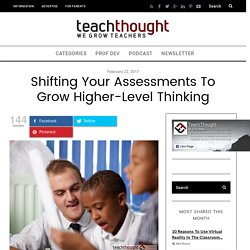
New Teachers: How to Use Classroom Data to Inform Instruction. One of the most challenging things to do as a new teacher is diagnose your students as learners.
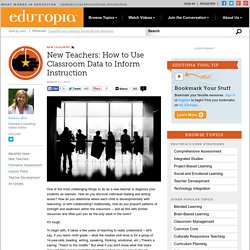
How do you discover individual reading and writing levels? How do you determine where each child is developmentally with reasoning, or with collaborating? Additionally, how do you pinpoint patterns of strength and weakness within the classroom -- and all this with limited resources and often just you as the only adult in the room? It's tough. To begin with, it takes a few years of teaching to really understand -- let's say, if you teach ninth grade -- what the median skill level is for a group of 14-year-olds (reading, writing, speaking, thinking, emotional, etc.)
53 Ways to Check for Understanding.
PBL. Homework research.pdf. 5 Proven Ways Students Can Learn Better. Children often have no comprehension of how good grades and a positive overall experience in public education can improve their lives for the better. This is why we as parents should do everything we possibly can to help make sure our kids enjoy school and get the best grades possible. Typically, kids that do well in the early years continue to confidently do well in school as they get older.
The biggest issues with children doing poorly in school usually develop in the earliest years of school, typically grades K-3. A Must Have Chart Featuring Critical Thinking Skills. Critical thinking is an essential skill in our life.It is through thinking critically that we get to sideline our biases(cultural, racial,ethnic...etc) and see the clear picture.Critical thinking is a sort of meta-thinking, that is thinking about thinking.
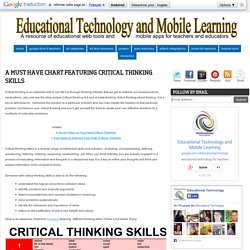
It is a key to self-reliance : memorize the solution to a particular problem and you may master the solution to that particular problem, but improve your critical thinking and you ll get yourself the tools to create your own effective solutions to a multitude of unfamiliar problems. related : Critical thinking refers to a diverse range of intellectual skills and activities : analyzing, conceptualizing, defining, questioning, inferring, listening, reasoning, synthesizing...etc When you think critically, you are actually engaged in a process of evaluating information and thoughts in a disciplined way. Teaching Practice. Evaluating Technology Use in the Classroom. Evaluating the use of technology in a classroom environment is not something most administrators are trained to do.
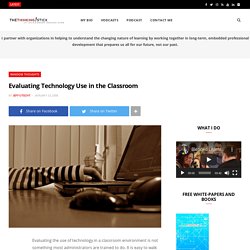
It is easy to walk into a classroom and see that every student is using a computer, but how do you really assess if and what type of learning is taking place? In the past, I have had administrators tell me “I walked into the teacher’s room and all the students were on laptops.” As though just the site of students working on laptops meant they were engaged in the learning process.
Edudemic. I remember when I first figured out the “power of the pair”.
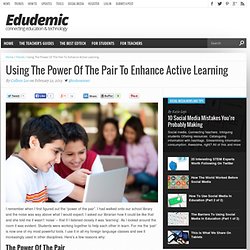
The 7 Most (And Least) Effective Ways To Improve Student Achievement. Students Share Characteristics Of Their Favorite Teachers. A few weeks ago I had a Twitter dialogue with Reed Gillespie ( @rggillespie ) an AP at Kettle Run High School in Nokesville, VA. and Angela Maiers ( @AngelaMaiers ) who coined the phrase #YouMatter and is an author, educator, and national speaker. Our conversation revolved around a post from Angela titled 12 Things Kids Want from Their Teachers . 27 Simple Ways To Flip The Classroom. 7 Ways To Use Your iPad In The Classroom 14.67K Views 0 Likes There's a plethora of ways to use your iPad in the classroom but this infographic details some insanely useful apps, methods, and ideas for all teachers.
Instructional leadership. Marc Prensky - What is the role of the teacher in todays world? Top 12 Ways to Increase Student Participation. Call it "active learning," or "classroom participation" -- every teacher wants to know how to motivate students to particpate, and how to nurture more involved students and fewer apathetic ones.
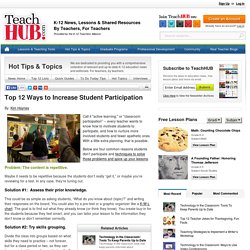
With a little extra planning, that is possible. Below are four common reasons students don’t participate and techniques to solve those problems and spice up your lessons. Problem: The content is repetitive. Maybe it needs to be repetitive because the students don’t really “get it,” or maybe you’re reviewing for a test. In any case, they’re tuning out. Solution #1: Assess their prior knowledge. This could be as simple as asking students, “What do you know about (topic)?” Technology in the classroom tools that keep parents informed about classroom...
A Teacher's Guide to Communicating with Parents. “I’m already getting parent phone calls and it’s August!
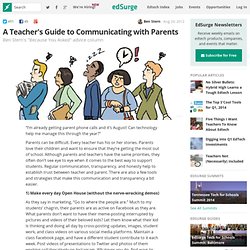
Can technology help me manage this through the year?” Parents can be difficult. Every teacher has his or her stories. Experienced Teachers Reflect on Their First Year. This year I had the opportunity to work with many educators in national and global workshops.
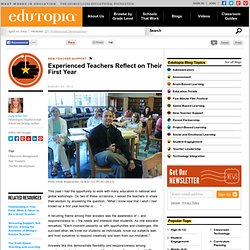
On two of these occasions, I asked the teachers to share their wisdom by answering the question, "What I know now that I wish I had known as a first year teacher is . .